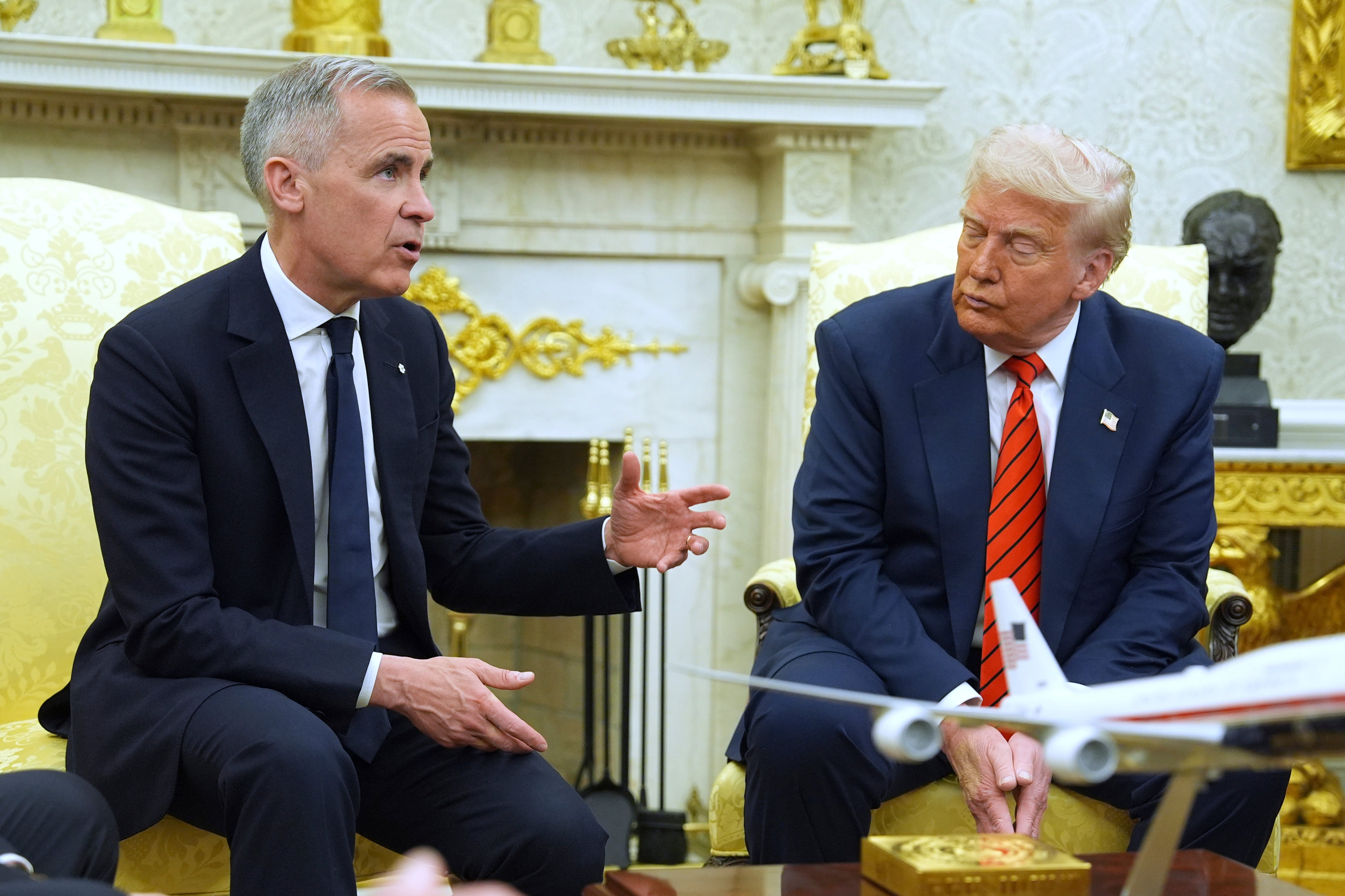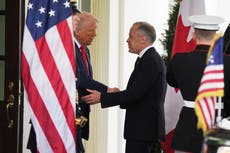As a Canadian, I can see the fatal flaw in Keir Starmer’s deal with Donald Trump
As Donald Trump and the British prime minister declare victory after agreeing on a trade deal, Canadian author and commentator Stephen Marche says the brutal truth is that it leaves Britain more vulnerable than ever


Starmer called it a “fantastic, historic” day, but while he and Donald Trump were busy praising their plan as a “breakthrough deal”, the details were still hazy. After all of his pleading and self-abasement in the Oval Office, the letter from the King and all the rest of it, all we knew for sure is the UK has less access to US markets and the US has more access to UK markets than it had in February, and the 10 percent tariff rate still applies.
It will do nothing for the UK economy. Indeed, Andrew Bailey, the governor of the Bank of England, has already said that the deal will not be enough to dampen uncertainty. All that we do know for sure is that the British now lead the world in prostrating themselves before Trump for no noticeable gain. And as recent history from Canada attests, I am also certain that Trump will be waiting to tear up the agreement whenever he chooses.
This is why our new prime minister, Mark Carney, set a different tone. He defined his campaign in a single sentence: “Our old relationship with the United States, a relationship based on steadily increasing integration, is over,” he said.
Only a week after his victory, Carney showed up at the White House for the most important meeting by a foreign leader since the humiliation of Zelensky. Carney didn’t speak much, but he didn’t have to. The contrast between the two men showed just how far the two countries have diverged. Canada, with Carney, is now at the forefront of the international effort to build economic, political and military structures without the United States.
Carney is the rules-based global order coalesced into a man who can walk around. Carney is Trump’s opposite – a boring, decent, responsible human being who has gone from success to success. He is a financial crisis manager of the highest order, with experience handling the 2008 crash and Brexit effectively, first as governor of the Bank of Canada, then as governor of the Bank of England. Unlike Trump, he has no entertainment value.
“You campaign in poetry. You govern in prose,” Carney told a rally just before the election. “As the assembled media will tell you, I campaigned in prose. So I’m going to govern in econometrics.” That should tell you just how unglamorous a politician the man is. He uses “econometrics” as a punchline.
Canada doesn’t feel much like laughing right now anyway. The brokenness of the relationship with our neighbour is not a partisan matter; the sense of threat from America is well understood across the political spectrum. It’s not like the Conservatives took a different position. Pierre Poilievre, the Conservative candidate, could not have been more explicit: “Canada will never be the 51st state.” Stephen Harper, who served as prime minister for 10 years, declared that the country should sustain “any level of damage” in resistance to American attempts at annexation.
Canadians elected Mark Carney in part to stand up to Donald Trump, and the world is taking note. As one of the world’s leading economists and a man with deep connections throughout the global economic order, he is best poised to lead us out of the American sphere of influence and create new institutions to protect us from a newly belligerent United States. The tariff war is only the beginning.

Trump’s trade “strategy”, if that’s the right word, is reminiscent of the scene from Blazing Saddles where the sheriff takes himself hostage by pointing a gun to his own head. There’s no way to plan for the implicit chaos of the current American administration. Perhaps Trump will randomly change his mind on tariffs as American economic pain grows. Perhaps the threats to Canada can be resolved by a straight bribe, through one of Trump’s various memecoin ploys.
Canada is already making adjustments. After the imposition of tariffs, Canada’s exports to the United States declined 6.6 per cent. But its exports to the rest of the world increased 24.8 per cent, almost entirely offsetting the difference. America, it appears, is not a necessary nation.
Trump has taught Canada, and through Canada, the rest of the world, an invaluable lesson: if you make a deal with the American government, as we did with Trump’s first administration in 2018, it’s not a deal; they can just change their mind whenever they want. If you buy American military hardware, the president has been explicit that you are buying a degraded version because “we like to tone them down about 10 per cent, which probably makes sense because someday maybe they’re not our allies, right?” That question applies to all of America’s allies, not just Canada.
Trump has taught Canada, and the rest of the world, an invaluable lesson: if you make a deal with the American government, it’s not a deal
Quite outside the question of the threat to our sovereignty, Canada cannot be tethered to a dying animal. With or without Trump, the American condition worsens day by day. The hyper-partisan politics, the massive inequality in its economy, the declining trust in institutions, the collapse of the legal system, the rising sense of the illegitimacy of power itself – all of these fires are about to have mass poverty poured over them like petrol.
Trump’s next hundred days will, in all likelihood, be more chaotic than the last hundred. When the United States faces its next debt ceiling crisis in August or September, it will most likely be in recession, with debt servicing costs higher than military spending, a promised five trillion in tax cuts, and zero appetite for spending cuts to Medicaid and social security.
Something has to give. America is about to face some very adult economic decisions; there are no adults in the room to answer them. America’s bullying is dangerous, but its self-destruction is actually what Canada and the rest of the world needs to fear.

“If the United States no longer wants to lead, Canada will,” Carney said early in his campaign. Malcolm Turnbull, the former Prime Minister of Australia, Canada’s hotter cousin, has said, “Carney is the man for the times.” Of all the middle powers, we understand America best. We are closer than Europeans or the Japanese. We can see America more clearly. The United States is a bus that Trump is driving over a cliff, and Canada has hired Carney to jump out with the least amount of injury possible. The rest of the world will have to follow when they realise the other option is crashing out.
Starmer has chosen another path; it is not a path of security or independence, even more so now that Trump knows that Britain is a pushover. Starmer may be feeling confident today, but as more details emerge, there will be many wondering whether he should have pulled a Carney instead.
The Next Civil War: Dispatches from the American Future by Stephen Marche is published by Simon & Schuster
Join our commenting forum
Join thought-provoking conversations, follow other Independent readers and see their replies
Comments


Bookmark popover
Removed from bookmarks